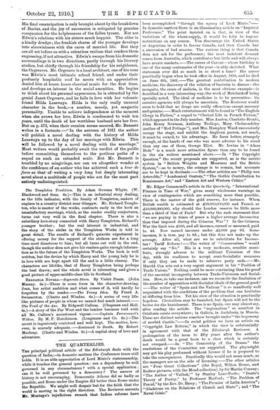THE QUARTERLIES.
Tax principal political article of the Edinburgh deals with the question of India,—in domestic matters the Conference truce still holds. It is an able appreciation of Lord Minto's statesmanship, while it touches the general question : can a dependency be well governed in any circumstances ? with a special application : can it be well governed by a democracy ? The answer of history is not encouraging. Democratic Athens did as badly as possible, and Rome under the Empire did better than Rome under the Republic. We .taig,let well despair but for the faith that the world is moving in the right direction. The Reviewer comets 11r. Montagu's injudicious remark that Indian reforms have been accomplished "through the agency of Lord Minto."— In domestic matters there is an illuminating article on "Imperial Preference." The point insisted on is that, in view of the variations of the wheat-supply, it would be folly to impose restrictions on any source. You discourage the United States. or Argentina in order to favour Canada, and then Canada has a succession of bad seasons. The curious thing is that Canada does not ask for the preference ; the most insistent demand comes from Australia, which contributes but little and will always have nearer markets.—The career of Cavour—whose birthday is one of the many centenaries of the year—is ably sketched. What statesman ever did so much in so short a time? His career practically began when he took office in August, 1850, and he died. on June 6th, 1861.—The greatest contribution to modern medicine, the discovery of the relation of bacteria to disease—the. mosquito, the cause of malaria, is the most obvious example—is described in a very interesting way, the work of Metchnikoff being- specially noted. The ideal of medicine is to be preventive : its. curative agencies will always be uncertain. The Reviewer would seem to hold that no drugs are really efficacious except mercury- and quinine.—Much entertainment will be found in "The English Clergy in Fiction," a sequel to "Clerical Life in French Fiction,"
which appeared in the July number. Miss Austen, Charlotte Bronte,. John Henry Newman, Anthony Trollope, Mary Cholmondeley
(author of "Red Pottage"), and Mrs. Humphry Ward successively- occupy the stage, and exhibit the Anglican parson, not much. it must be owned, to his advantage. He fares better, strangely enough, at the hands of one who was more adverse to his creed than any one of them, George Eliot. Mr. Irwine in " Adam Bede" is a much more attractive figure than any to be found in the six writers mentioned above.—in " The Copyright Question" the recent proposals are supported, as is the metric system in " British Weights and Measures and the Metric. System,"--as to money, the coinage is to remain, but accounts are to be kept in decimals.—The other articles are "Philip van Artevelde," " Academical Oratory,'" The Gothic Contribution to Renaissance Art," and " Eastern Art and Western Critics."
Mr. Edgar Crammond's article in the Quarterly, "International Finance in Time of War," gives many wholesome warnings ha view of contingencies which are something more than possible.. There is the matter of the gold reserve, for instance. When. British wealth is estimated at £18,000,030,000 and French at £10,000,004,000, why should the London reserve be little more- than a third of that of Paris? But why the rash statement that. "we are paying in times of peace a higher average Income-tax than that imposed during the Crimean War " ? In the Crimean. War the limit was £100, and all incomes, earned or unearned, paid Is. ad. Now earned incomes under £2,000 pay 9d. Some. incomes, it is true, pay Is. 8d. ; but this does not make up the average. After all, what are we to substitute for Income- tax ? Tariff Reform ?—The writer of " Conservatism " would certainly say "No." His is a very moderate, sensible mani- festo, strongly adverse to the militant Unionism of the- day, with its readiness to accept semi-Socialistic measures if only they can be made to subserve party ends.—Mr.. Harold Cox sets out a very cogent argument in his " Position of Trade Unions." Nothing could be more convincing than his proof of the essential incongruity between Trade-Unionism and Social- ism. How, to take one instance, can we reconcile the limitation of the number of apprentices with Socialist ideals of the general good? —The writer of " Spain and the Vatican " is so manifestly well acquainted with the conditions of the problem that one hesitates at differing from him. Yet his view of the situation is practically hopeless. Clericalism may be banished, but Spain will not be the better for the banishment. There is no Spain, one may almost say, after reading the article. The "regionalism" so manifest in Catalonia exists everywhere; in Galicia, in Andalusia, in Murcia.. These are distinct nations somehow brought under " the hegemony of morbid Castile."—In social politics we have an article on "Copyright Law Reform," in which the view is substantially in agreement with that of the Edinburgh Reviewer. A. prolongation of the term to fifty years after the author's- death would be a great boon to a class which is certainly not overpaid.—In " The Censorship of the Drama" the resolutions of the Committee are supported. The playwright may get his play performed without license if he is prepared to, take the consequences. Practically this would not mean much, as the managers are on the aide of licensing.—The other artieles are "Four Great Collections" (the Royal, Wilton House, and Radnor pictures, with the Mond collection), by Sir Martin Conway; " The Author of Vathek,'" by Stanley Lane-Poole ; " Dante's Theory of Poetry," by Professor Herford ; " The Problem of Pascal," by the Rev. Dr. Barry ; " The Promise of Latin America"; " Gladstone on the Relations of Church and State" ; and " The
Naval Crisis."














































 Previous page
Previous page